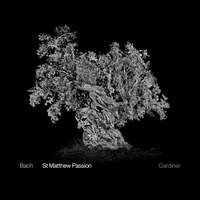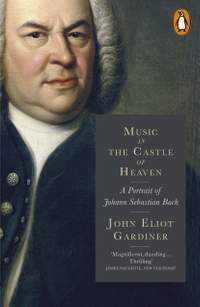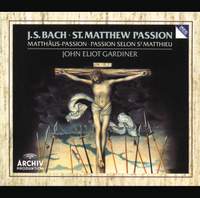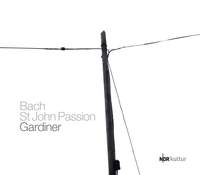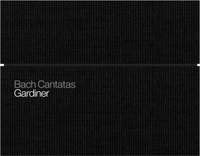Interview,
Sir John Eliot Gardiner revisits the St Matthew Passion
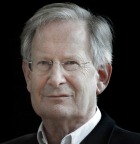 Sir John Eliot Gardiner’s landmark recording of the St Matthew Passion with his Monteverdi Choir and English Baroque Soloists in the late 1980s is still widely regarded as one of the most revelatory accounts of the work on disc for its tautness, dramatic energy and innate underlying understanding of the work’s imposing architecture. Over the thirty-odd years since its release, Gardiner and his musicians have performed the work all over the world, and now (well into his eighth decade and with the experience of the mammoth ‘Cantata Pilgrimage’ of 2000 under his belt) he’s decided to record it afresh, this time live in concert rather than in the studio: last year, he and the Monteverdis (who celebrated their fiftieth anniversary in 2014) embarked on a six-month European tour with the work (taking in venues including the Barbican, the Paris Philharmonie, and the Amsterdam Concertgebouw), with all the singers performing from memory. The final concert in Pisa Cathedral (described in the Giornale della Music as ‘the most fluid, fresh and moving live performance of the St Matthew Passion we have ever heard’) was recorded for posterity and will be released on Gardiner’s own label Soli Deo Gloria tomorrow; the set also includes excerpts from the diaries and performances-notes which he wrote before and during the project.
Sir John Eliot Gardiner’s landmark recording of the St Matthew Passion with his Monteverdi Choir and English Baroque Soloists in the late 1980s is still widely regarded as one of the most revelatory accounts of the work on disc for its tautness, dramatic energy and innate underlying understanding of the work’s imposing architecture. Over the thirty-odd years since its release, Gardiner and his musicians have performed the work all over the world, and now (well into his eighth decade and with the experience of the mammoth ‘Cantata Pilgrimage’ of 2000 under his belt) he’s decided to record it afresh, this time live in concert rather than in the studio: last year, he and the Monteverdis (who celebrated their fiftieth anniversary in 2014) embarked on a six-month European tour with the work (taking in venues including the Barbican, the Paris Philharmonie, and the Amsterdam Concertgebouw), with all the singers performing from memory. The final concert in Pisa Cathedral (described in the Giornale della Music as ‘the most fluid, fresh and moving live performance of the St Matthew Passion we have ever heard’) was recorded for posterity and will be released on Gardiner’s own label Soli Deo Gloria tomorrow; the set also includes excerpts from the diaries and performances-notes which he wrote before and during the project.
I caught up with him a few weeks ago to chat about his lifelong relationship with a work which he described in his recent book on Bach as ‘a magnificent display of dramatic re-enaction’, and how his approach to performing it has evolved over the past three decades…
It’s 25 years since you last recorded the St Matthew Passion – how has your own personal relationship with the piece altered since then?
I think it has changed as a result of studying and performing all of the cantatas: though the Passions do belong to a different genre, you can look at them in some ways as expanded cantatas, and he uses a lot of the same techniques. Of course there aren’t the same dramatic tensions in the cantatas that you find in the Passions, but there’s an awful lot of the same connection between words and music - this extraordinary imaginative power that Bach has and can translate into word-settings, which really just leaves one aghast. I certainly feel I’ve grown a lot closer to at least some of the ways in which his creative mind was working as a result of his weekly experience of composing cantatas through my own experience of studying them, coming to terms with them and then performing them in a cycle.
How did the experience of making this new recording compare with working on that earlier one from the 1980s?
When we made the earlier recording, which we did in Snape Maltings, it was a tremendous labour of love, and there was a terrific atmosphere and intensity and commitment by everybody. We’d performed it as a group several times before - but it wasn’t like last year’s recording, where we’d performed it 16 times all over Europe, and all the singers were off-copy. There was a greater sense of familiarity, a greater sense of the experience of having lived through the music so intensely together as a group, and performing to very different audiences: some of them German-speaking, some of them emotionally very charged, as when we performed it in Brussels the day after the terrorist attack. So I suppose this latest recording has more complicity between the players and singers than the earlier one – but I don’t want to trash the earlier one, because I’m very fond of it! And it was a great stepping-stone, not just in my personal development but also in the development of the group and of everyone who took part in it. There were some phenomenal performances then: the singing of Barbara Bonney, Ann Monoyois, Michael Chance, and Anthony Rolfe Johnson above all. It was very special.
What are your feelings on the relatively recent vogue for staging the Passions, as Peter Sellars and Deborah Warner have done in Berlin and at Glyndebourne?
As I say fairly unequivocally in my book (Music in the Castle of Heaven: A Portrait of Johann Sebastian Bach), I don’t think these are operas, and if they’re treated as operas you might gain in certain areas but you lose an awful lot in others – the stagings I’ve seen literalise the dramatic tension, which I think is much more forceful if it’s implied rather than stated overtly. So I’m really not at all keen on staging them: I think if Bach had wanted to stage them, there was nothing to stop him writing operas. I’m sure there was nothing in his make-up that would have said he could not write an opera, but I just don’t think he’d have done it on a religious subject. That doesn’t mean that these aren’t intensely dramatic pieces – they are! - but they don’t require physical gesture, and all that writhing on the floor and touchy-feely staging that Peter Sellars does. To me that sits very uncomfortably with my conception of how these pieces really work and function, and adds something that, to me, is painfully gratuitous.
In your book you talk about how little information we have about how the Passions were first performed: the forces which were employed, the spatial layout of the musicians etc. How do we know what we do know, and how much did you bring that to bear on this recording?
There’s so much more that we don’t know about the way that Bach performed the St Matthew Passion than we do know, in the sense that we just don’t know how many performers were available to him: we know that he divided the Thomaner [the Leipzig boys’ choir] up into three different groups, but how many singers were actually available for the performances that he directed? Who was away sick, whose voice had broken, who had fled the school (because some of them did!)…we just don’t know. I’m really opposed to making dogmatic statements as to how many performers were involved – I think it’s unhelpful. The fact that there are ripieno copies, duplicate copies of certain parts, doesn’t mean that there weren’t also a lot that have got ‘lost in translation’ since Bach’s day, so the one-to-a-part theory that’s become very fashionable (and is much cheaper, of course, than using larger forces!) doesn’t hold sway over my thinking: I think it’s an interesting theory, but no more than that. I adjust the number of performers to the spaces that I’m going to be performing in, and since we perform for the most part in concert-halls, using just eight singers and single players in the strings and the winds would not seem to be satisfactory to me – I’d feel that I was short-changing the audience in terms of the dramatic impact that these pieces can have. Now of course one can argue it the other way round and say ‘So in that case why not have a huge choir and a huge orchestra…?’ Well, it is essentially chamber-music - intimate, dramatic, very personal music, and I think the numbers that we ended up with reflect that. There’s no lack of personal commitment, there’s no lack of personality, there’s no lack of intimacy: it seems to me a very reasonable and natural performing apparatus.
Tell me a little about your own earliest experiences with the work: when you first came to conduct it, were you consciously reacting against (or drawing inspiration from?) any interpretations or approaches you’d encountered on disc or in live performance?
I didn’t actually perform the St Matthew Passion until 1984 - though I’d done the St John quite early on, plus a few cantatas and the Magnificat and the Mass in B minor. It was too daunting, really: I felt I needed a few more semiquavers under my belt, as it were, before approaching it! My first experience of hearing the piece had been on a Good Friday in the Royal Festival Hall, with the Bach Choir under Reginald Jacques, and impressive though that was in many ways it did strike a foreign note to me. And then when the early music movement got going, I was particularly drawn to the recordings of Nikolaus Harnoncourt. I was terrifically inspired by his instrumental approach to the piece: he was a gamba-player and a continuo cellist, and you always feel that there’s a bass line that is actually driving the music, which I found hugely compelling. One can quibble with the choice of singers and the quality of the boys’ voices that were used, but I’m sure that was also the case in Bach’s day! Though some aspects of his interpretation can seem rather extreme, Harnoncourt was such an important pioneer, and if one can get through some of the mannerisms one realises what a brilliant interpreter and brain he was.
Is there a sense in which these latest recordings of the Passions stand as your personal definitive visions of the pieces, or do you think of your relationship with them as a perpetual work in progress?
These pieces are always evolving. Whether I’ll ever get to perform the St Matthew Passion again I have no idea, but they are such vivid presences in my life: even if I’m not actually performing them I’m thinking about them and I’m touched deeply by the music. There was a recent episode of Michael Berkeley’s Private Passions where he was interviewing a human rights lawyer, Philippe Sands, who was speaking very movingly about the Matthew (he’d chosen ‘Erbarme dich’ from my earlier recording with Michael Chance and Elizabeth Wilcock playing the violin obbligato), and he made what I thought was a very poignant point: he said that at the Nuremberg Trials in 1945 both the leading lawyers, both the defence and the prosecution, took comfort and solace in listening to the St Matthew Passion as the most important musical influence that existed in their lives. What does that tell us about human nature on the one hand and about the greatness of Bach on the other, that he can appeal to such extremes?
On a related note, I remember being rather surprised by Richard Dawkins’ choice of ‘Mache dich’ as part of his Desert Island Discs…
Really? And he’s quite a proselytising atheist, isn’t he?! Another quite famous atheist who adores Bach is Philip Pullman, whom I know a bit and who’s delightful. I was doing a documentary on Bach for the BBC a few years ago (A Passionate Life, broadcast in 2013), and when I went to talk to him he told me that he overcomes his religious qualms when it comes to listening to Bach. It really proves that you don’t need to be a card-carrying Lutheran in order to value and appreciate his music. And whilst I think it helps to come to terms, at one level or another, with the theology that imbues the music, that doesn’t shut off or limit the outreach of the music to people who’ve got no faith, or a different faith, or are opposed in one way or another. It is a magical phenomenon.
JS Bach: St Matthew Passion, BWV244
James Gilchrist (Evangelist), Stephan Loges (Jesus); Monteverdi Choir, English Baroque Soloists, Sir John Eliot Gardiner
Recorded in Pisa Cathedral during the Anima Mundi Festival as part of the Monteverdi Choir and Orchestra’s 2016 tour, Sir John Eliot Gardiner's new St Matthew Passion is released tomorrow on Soli Deo Gloria.
Available Formats: 2 CDs, MP3, FLAC, Hi-Res FLAC
'Gardiner is famous for (among other things) his “Bach Cantata Pilgrimage”, which criss-crossed Europe in 2000, performing all the cantatas. That was in itself the culmination of decades of involvement in Bach’s music. But now we have a culmination of a different kind, representing years of study as well as performance: a hefty, beautifully produced book which engages deeply with Bach the composer and Bach the man.' (The Telegraph)
Available Format: Book
You can view Sir John Eliot Gardiner's complete available discography here.
Related recordings
JS Bach: St Matthew Passion, BWV244
Anthony Rolfe Johnson, Andreas Schmidt, Barbara Bonney, Michael Chance, Cornelius Hauptman; Monteverdi Choir, English Baroque Soloists, Sir John Eliot Gardiner
'What makes Gardiner's St Matthew Passion stand out in the face of stiff competition is, more than anything, his vivid sense of theatre. Bach's score is, after all, a sacred drama and Gardiner interprets this aspect of the work with lively and colourful conviction.' (Gramophone Guide)
Available Formats: MP3, FLAC
JS Bach: St John Passion, BWV245
Mark Padmore (Evangelist), Hanno Müller-Brachmann (Jesus); Monteverdi Choir, English Baroque Soloists, Sir John Eliot Gardiner
'To borrow a phrase used more than one by Gardiner, his is a reading which lives viscerally in the 'here and now'...Truly, this is a jewel beyond price.' (BBC Music Magazine)
Available Formats: 2 CDs, MP3, FLAC, Hi-Res FLAC
'One of the most ambitious musical projects of all time.' (Gramophone)
Available Format: 56 CDs


